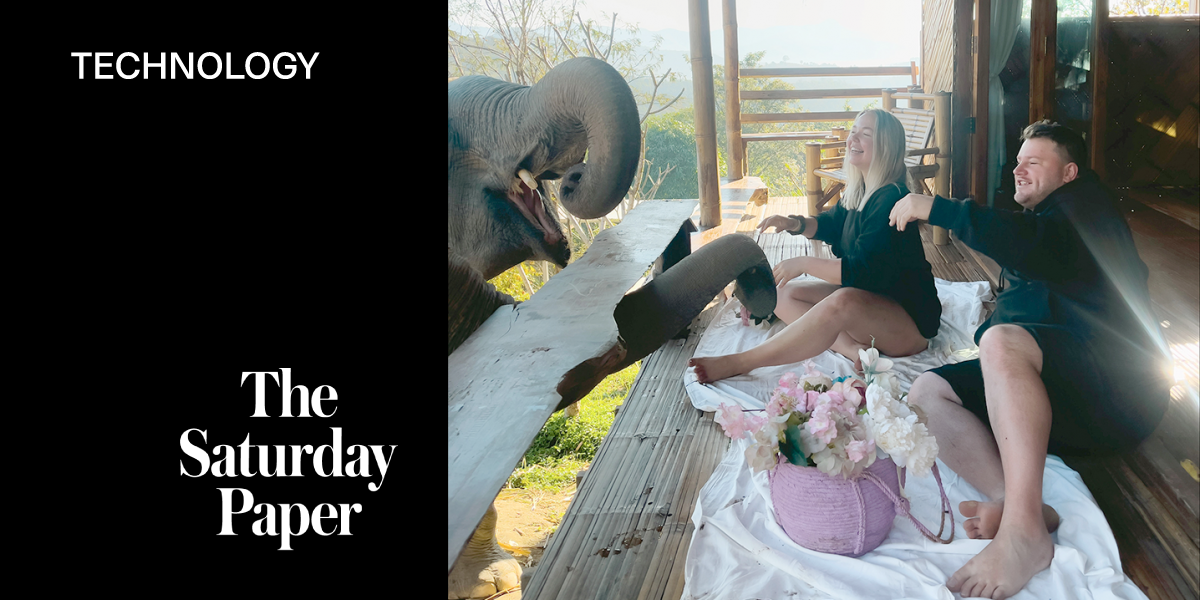The costs of becoming a digital nomad
8 min read
I am speaking with Zackery Bertram from a sound-insulated booth in the co-living co-working space Alt_ChiangMai. Through the padded door is a sleek shared office of flatpack desks and chairs, empty for the weekend but for a few diligent digital nomads affixed to their screens. Outside is a sunny Saturday in Thailand’s second largest city, although seasonal burning in the surrounding mountains placed yesterday’s air quality among the world’s worst 10 cities, between Kathmandu and Krasnoyarsk.
Despite the resultant dip in the 30,000 active nomads, the co-working spaces, cafes and bars that cater to them continue their daily bustle while the streets still teem with scooters.
At 30, Zach has landed on his feet in Chiang Mai. He speaks in the upbeat cadence of a personal trainer, which he was back in Perth. He came to Bangkok to teach English to “try something completely different for this last period of still being young”. Today he works two full-time jobs and one part-time job as a project manager in Web3, and is so busy that we have to connect over Zoom, despite being in the same city.
“Everyone is perpetually online,” he explains, adding his co-workers are spread throughout Asia, though he can’t be sure exactly where.
Zach owns the title “digital nomad”, although many who also satisfy the definition of mobility and digital fluency shun it. He loves the lifestyle that a salary in US dollars affords. “I’m making more than I was back there in Perth, but it’s just the quality of life is an arm and a leg above and I don’t need to be stressed about trying to save. I don’t need to budget myself and if I want to take a trip down south here, I can, and it doesn’t break the bank.”
At two by three metres, with a window that looks onto a wall and a single bed that flips over into a desk, my room is the cheapest at Alt_ChiangMai. Still, the rate of 1050 baht a night after tax is three times the provincial daily minimum wage, which was raised late last year. More expensive options have a queen-sized bed with an ensuite and a view into the neat, walled courtyard.
Since borders reopened last year, this transient population is returning to pre-Covid levels, restoring Chiang Mai’s status as one of the world’s top digital nomad hubs.
Once on an offshoot of the Silk Road and historically hospitable to nomads, this city encourages the digitally self-employed to make the leap, in the conducive conditions of a post-pandemic surge in international travel, widespread acceptance of remote work and a tech skills crunch. And it’s a comparatively cheap base at a time when the cost of living – and especially renting – in so many cities is soaring.
Alt_ChiangMai is an offering aimed at the more mature end of the digital nomad market, with a goal of bringing people together. “If you think about the digital nomad community – one thing they express as a common problem is loneliness,” says John Ho, the owner. “They’re solo travellers and it’s very hard to make good relationships when you’re jumping from one place to another.”
Rooms have been full since October and Ho is looking to expand into a second Chiang Mai location. A minimum stay of a week reduces “churn”, while activities include a weekly ice bath, yoga class and “family meeting”, where members suggest upcoming activities. At the weekly meeting, one tall Dane was leaving. He’d been crowned “King of Alt_Chiang Mai” – and wore a sash confirming the title. The new king, an English cyber security consultant, was awarded the sash for his prowess at the weekly trivia night. The other members were genuinely sad at the Dane’s departure.
A same-same-but-different character runs through Chaing Mai’s digital nomad sphere, which is more a constellation of groups and free-floating individuals than a cohesive community. Most inhabitants are technologically fluent, free-market types who work in tech or content creation and move cities or countries on a whim.
Michael from Newcastle and Josie from Sydney call Chiang Mai their base. Michael, who’s 32, runs a careers consultancy business, operating seamlessly enough to give the illusion that he is working from Australia, while Josie, at 27, has parlayed a lower-cost lifestyle into a career as an influencer. In Sydney she did marketing for a gym, but now she has 130,000 subscribers and makes a living from videos exploring Asia.
“We needed a six-month runway to get things profitable and even now I don’t think I could afford to live here,” Josie says on a call during an Australian visit. “We went out to Bangkok, Malaysia, Philippines and we came back to Chiang Mai for months to get all the work done because it’s such an affordable, comfortable and good internet base.” Josie is currently working from India.
Another resident, Andy, was with a global NGO in Myanmar for four years before returning to Australia for a wedding in 2020 only to find himself stuck in Melbourne during lockdown. The military coup in Myanmar means he cannot return to that life but, by basing himself in Chiang Mai, he can continue to work internationally. Over the next six months his schedule is hectic – a week each in Uganda, Malawi, Bhutan, Ethiopia and London. “I’m approaching this from a practical level, which I think is healthy – I’m not seeking enlightenment or some spiritual journey.” For Andy, who at 41 is one of the older Alt_ChiangMai guests, the digital nomad lifestyle has lost its sheen. “I personally don’t think it’s sustainable. I’m only looking for the next couple of months,” he tells me. “You always had best friends but they would come and go, so you were always starting again.
“Beyond that, I can see myself going back to Australia and laying down roots and having a fairly normal life, because right now it feels more transactional.”
For his part, Michael misses the big group of friends he had in Newcastle. Though he’s a firm advocate of the lifestyle, the transience can be disorienting. “There are definitely people there long-term,” he says, “… but others, you just rock up one day and they’re gone.”
Shaun Busuttil, who is studying digital nomads at the University of Melbourne, says this is typical. He notes a “tension between the individual freedom to move and the desire or the need to connect with people”. Where human needs are wanting, opportunities emerge. Busuttil explains: “It’s a lifestyle that’s enabled by the current neoliberal system – so a lot of nomads are quite staunchly neoliberal or capitalistic.”
Alt_ChiangMai is at one end of the Nimmanhaemin district. The high-density sector of cafes, restaurants and bars caters to digital nomads and represents the face of transnational gentrification. “It’s a problem,” admits Busuttil. “Not just a problem with nomads but with tourism in general displacing local populations in their own home and their own cities.”
A geospatial study by Dr Yanin Huyakorn of Chulalongkorn University in Bangkok observes how the density of accommodation in the adjacent Old City has increased over time, pushing out locals. Huyakorn, who grew up in Chiang Mai, also notices changes on the street.
“The rhythm has changed. You don’t see everyday life of normal people, you see more people hanging out in the cafe and, at some point, they do yoga in the park,” she says.
The traditional fabric of life is fraying. “It’s not like, ‘I know your mother, I know your grandmother’ anymore, we used to have children in the community visit one house after another and it’s not like that anymore. [Now] it’s more like our hotel is full, we can transfer a guest.”
At the upmarket Cafe Oasis during the weekly Digital Nomad Brunch Club, Tina is brimming with excitement. Her daughter is arriving from Singapore for a visit later today. On the road for 30 years throughout Australia and Asia, she was nomadic before digital nomads existed. “I get bored being in one place, there’s too much of the world to experience,” she tells me.
Growing up, she attended 15 schools throughout rural Australia. At 18 she joined the army and became an illustrator.
“I loved tech and I moved into that world and just kept evolving,” she says. “I went from graphic designer to a web designer to a business coach to a brand strategist.”
Now firmly embedded in the digital economy, her latest hustle is teaching customers how to use AI to write books, with a book written by AI. Tina says she doesn’t get lonely – she speaks with friends from her travels and her family daily via WhatsApp – but during our conversation she glances frequently at her phone, checking for news about her daughter’s imminent arrival.
Back in the foyer of Alt_ChiangMai awaiting my taxi to the airport, the Dane, erstwhile king of Alt_Chiang Mai, is leaving. The goodbyes are effusive, even sentimental. At the airport I see him again waiting for his flight, looking at his phone, surrounded by tourists oblivious to their proximity to royalty.
By the time I land at my next destination, both of us have been ejected from the residents’ chat groups. It might seem cold, but it’s the only way to purge the feeds of members who have moved on.
This article was first published in the print edition of The Saturday Paper on
April 1, 2023 as “No fixed web address”.
For almost a decade, The Saturday Paper has published Australia’s leading writers and thinkers.
We have pursued stories that are ignored elsewhere, covering them with sensitivity and depth.
We have done this on refugee policy, on government integrity, on robo-debt, on aged care,
on climate change, on the pandemic.
All our journalism is fiercely independent. It relies on the support of readers.
By subscribing to The Saturday Paper, you are ensuring that we can continue to produce essential,
issue-defining coverage, to dig out stories that take time, to doggedly hold to account
politicians and the political class.
There are very few titles that have the freedom and the space to produce journalism like this.
In a country with a concentration of media ownership unlike anything else in the world,
it is vitally important. Your subscription helps make it possible.



